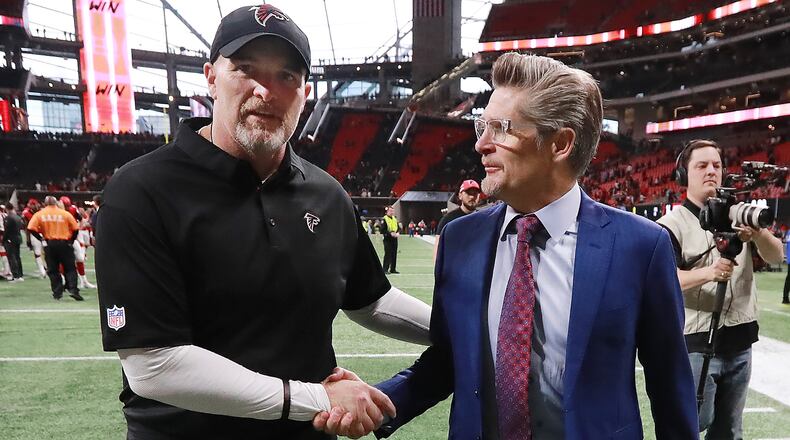The Falcons had roughly $6 million in salary-cap space when the NFL free-agent negotiating period began Monday afternoon. Only three teams had less space. And the Falcons will need roughly $8 million to sign their draft picks in May.
This is a bad place to be for a team coming off a 7-9 season and with some major holes to fill. The Falcons believe they are not that team. They think they can bolster their offensive and defensive lines with draft picks and some modest free-agent signings. They expect to see internal improvements via better coaching and injury luck.
I do not blame the Falcons for being optimistic. All teams should be thinking that way at this time of year. It’s fine to be hopeful as long as it doesn’t cross the line into delusion, and the Falcons aren’t there.
However, I will register my skepticism about the Falcons’ roster needing only minor repair. I don’t think it’s a good look for a team to be this cap-strapped after missing the playoffs. The same goes for looking to the draft for major help, with No. 14 as the highest pick.
The Falcons need two starting guards (or a starting right tackle if Ty Sambrailo ends up inside) and better overall depth along the offensive line. They need better pass-rush production. The Falcons need run-stopping help along the defensive line - recall that during their mid-season fade Cleveland, Dallas, New Orleans and Baltimore ran over them.
The Falcons don’t have the cap space to address those needs in free agency. They don’t have the space to do much of anything. They are squeezed because they have too many under-performing players taking up a big chunk of their cap at the same time they’ve increased salary outlays for their stars.
The latter group includes quarterback Matt Ryan, defensive tackle Grady Jarrett, wide receiver Julio Jones and left tackle Jake Mathews. Ryan’s cap figure is $22.8 million, Jarrett’s franchise tag counts $15.2 million against the cap, Jones counts $13.5 million and Matthews counts $11.1 million in the first year of his extension.
No problems there. The cap hits for Ryan, Jones and Matthews are, in order, 13th-, 12th- and 11th-highest at their respective positions. You'd like to see a lower figure for Jarrett, whose cap hit is third-highest among defensive tackles, but the Falcons had to use the franchise tag because they couldn't risk letting him hit the free-agent market.
Then there’s the other side of that coin. Cornerback Desmond Trufant’s cap salary is $13.9 million, edge rusher Vic Beasley’s is $12.8 million and right tackle Ryan Schrader’s is $7.8 million. Plenty of problems there.
Trufant’s cap figure is seventh-highest among cornerbacks and Beasley’s is 21st among edge rushers. Neither player is among the best at their position. Schraeder (sixth-highest cap figure among right tackles) isn’t even a starter anymore.
The Falcons could have cleared salary-cap space by cutting more under-performing players after they jettisoned cornerback Robert Alford and defensive end Brooks Reed. They would need to replace those players, though. That they didn’t do so before free agency signals they don’t think they can do it with players on the market.
The Falcons have until July 15 to work on a long-term deal with Jarrett that would provide cap relief. They have even longer to do so with Jones (general manager Thomas Dimitroff has said he’s confident that will happen). But, again, their lack of urgency in doing those deals suggests the Falcons never were too worried about being players in this free-agent market.
Maybe the Falcons are right to sit out what could be an overheated free agent market. The reality is their salary-cap crunch didn’t give them much choice. That puts pressure on the team-building duo of Dimitroff and Dan Quinn to find some players in the draft who can help the Falcons now.
Quinn and his new-look staff will have to get results with those prospects and the underachieving players already on the roster. The Falcons will have to be healthier in 2019, a factor that mostly is outside of their control. These are the realistic ways for the Falcons to get better because their salary cap is in shoddy shape.
This is what happens when a team with highly-paid stars underachieves and pays too many players like stars and they turn out to be subpar. The Falcons believe 2019 will be different because they don’t have any major roster deficiencies and drafting and coaching will shore up their weaknesses. I don’t blame them if they really believe that narrative.
I just don’t agree.
About the Author
The Latest
Featured


